I'm trying to set up a Redis cluster and I followed this guide here: https://rancher.com/blog/2019/deploying-redis-cluster/
Basically I'm creating a StatefulSet with a replica 6, so that I can have 3 master nodes and 3 slave nodes. After all the nodes are up, I create the cluster, and it all works fine... but if I look into the file "nodes.conf" (where the configuration of all the nodes should be saved) of each redis node, I can see it's empty. This is a problem, because whenever a redis node gets restarted, it searches into that file for the configuration of the node to update the IP address of itself and MEET the other nodes, but he finds nothing, so it basically starts a new cluster on his own, with a new ID.
My storage is an NFS connected shared folder. The YAML responsible for the storage access is this one:
kind: Deployment
apiVersion: extensions/v1beta1
metadata:
name: nfs-provisioner-raid5
spec:
replicas: 1
strategy:
type: Recreate
template:
metadata:
labels:
app: nfs-provisioner-raid5
spec:
serviceAccountName: nfs-provisioner-raid5
containers:
- name: nfs-provisioner-raid5
image: quay.io/external_storage/nfs-client-provisioner:latest
volumeMounts:
- name: nfs-raid5-root
mountPath: /persistentvolumes
env:
- name: PROVISIONER_NAME
value: 'nfs.raid5'
- name: NFS_SERVER
value: 10.29.10.100
- name: NFS_PATH
value: /raid5
volumes:
- name: nfs-raid5-root
nfs:
server: 10.29.10.100
path: /raid5
---
apiVersion: v1
kind: ServiceAccount
metadata:
name: nfs-provisioner-raid5
---
apiVersion: storage.k8s.io/v1
kind: StorageClass
metadata:
name: nfs.raid5
provisioner: nfs.raid5
parameters:
archiveOnDelete: "false"
This is the YAML of the redis cluster StatefulSet:
apiVersion: apps/v1
kind: StatefulSet
metadata:
name: redis-cluster
labels:
app: redis-cluster
spec:
serviceName: redis-cluster
replicas: 6
selector:
matchLabels:
app: redis-cluster
template:
metadata:
labels:
app: redis-cluster
spec:
containers:
- name: redis
image: redis:5-alpine
ports:
- containerPort: 6379
name: client
- containerPort: 16379
name: gossip
command: ["/conf/fix-ip.sh", "redis-server", "/conf/redis.conf"]
readinessProbe:
exec:
command:
- sh
- -c
- "redis-cli -h $(hostname) ping"
initialDelaySeconds: 15
timeoutSeconds: 5
livenessProbe:
exec:
command:
- sh
- -c
- "redis-cli -h $(hostname) ping"
initialDelaySeconds: 20
periodSeconds: 3
env:
- name: POD_IP
valueFrom:
fieldRef:
fieldPath: status.podIP
volumeMounts:
- name: conf
mountPath: /conf
readOnly: false
- name: data
mountPath: /data
readOnly: false
volumes:
- name: conf
configMap:
name: redis-cluster
defaultMode: 0755
volumeClaimTemplates:
- metadata:
name: data
labels:
name: redis-cluster
spec:
accessModes: [ "ReadWriteOnce" ]
storageClassName: nfs.raid5
resources:
requests:
storage: 1Gi
This is the configMap:
apiVersion: v1
kind: ConfigMap
metadata:
name: redis-cluster
labels:
app: redis-cluster
data:
fix-ip.sh: |
#!/bin/sh
CLUSTER_CONFIG="/data/nodes.conf"
echo "creating nodes"
if [ -f ${CLUSTER_CONFIG} ]; then
if [ -z "${POD_IP}" ]; then
echo "Unable to determine Pod IP address!"
exit 1
fi
echo "Updating my IP to ${POD_IP} in ${CLUSTER_CONFIG}"
sed -i.bak -e "/myself/ s/[0-9]\{1,3\}\.[0-9]\{1,3\}\.[0-9]\{1,3\}\.[0-9]\{1,3\}/${POD_IP}/" ${CLUSTER_CONFIG}
echo "done"
fi
exec "$@"
redis.conf: |+
cluster-enabled yes
cluster-require-full-coverage no
cluster-node-timeout 15000
cluster-config-file /data/nodes.conf
cluster-migration-barrier 1
appendonly yes
protected-mode no
and I created the cluster using the command:
kubectl exec -it redis-cluster-0 -- redis-cli --cluster create --cluster-replicas 1 $(kubectl get pods -l app=redis-cluster -o jsonpath='{range.items[*]}{.status.podIP}:6379 ')
what am I doing wrong?
this is what I see into the /data folder:

the nodes.conf file shows 0 bytes.
Lastly, this is the log from the redis-cluster-0 pod:
creating nodes
1:C 07 Nov 2019 13:01:31.166 # oO0OoO0OoO0Oo Redis is starting oO0OoO0OoO0Oo
1:C 07 Nov 2019 13:01:31.166 # Redis version=5.0.4, bits=64, commit=00000000, modified=0, pid=1, just started
1:C 07 Nov 2019 13:01:31.166 # Configuration loaded
1:M 07 Nov 2019 13:01:31.179 * No cluster configuration found, I'm e55801f9b5d52f4e599fe9dba5a0a1e8dde2cdcb
1:M 07 Nov 2019 13:01:31.182 * Running mode=cluster, port=6379.
1:M 07 Nov 2019 13:01:31.182 # WARNING: The TCP backlog setting of 511 cannot be enforced because /proc/sys/net/core/somaxconn is set to the lower value of 128.
1:M 07 Nov 2019 13:01:31.182 # Server initialized
1:M 07 Nov 2019 13:01:31.182 # WARNING you have Transparent Huge Pages (THP) support enabled in your kernel. This will create latency and memory usage issues with Redis. To fix this issue run the command 'echo never > /sys/kernel/mm/transparent_hugepage/enabled' as root, and add it to your /etc/rc.local in order to retain the setting after a reboot. Redis must be restarted after THP is disabled.
1:M 07 Nov 2019 13:01:31.185 * Ready to accept connections
1:M 07 Nov 2019 13:08:04.264 # configEpoch set to 1 via CLUSTER SET-CONFIG-EPOCH
1:M 07 Nov 2019 13:08:04.306 # IP address for this node updated to 10.40.0.27
1:M 07 Nov 2019 13:08:09.216 # Cluster state changed: ok
1:M 07 Nov 2019 13:08:10.144 * Replica 10.44.0.14:6379 asks for synchronization
1:M 07 Nov 2019 13:08:10.144 * Partial resynchronization not accepted: Replication ID mismatch (Replica asked for '27972faeb07fe922f1ab581cac0fe467c85c3efd', my replication IDs are '31944091ef93e3f7c004908e3ff3114fd733ea6a' and '0000000000000000000000000000000000000000')
1:M 07 Nov 2019 13:08:10.144 * Starting BGSAVE for SYNC with target: disk
1:M 07 Nov 2019 13:08:10.144 * Background saving started by pid 1041
1041:C 07 Nov 2019 13:08:10.161 * DB saved on disk
1041:C 07 Nov 2019 13:08:10.161 * RDB: 0 MB of memory used by copy-on-write
1:M 07 Nov 2019 13:08:10.233 * Background saving terminated with success
1:M 07 Nov 2019 13:08:10.243 * Synchronization with replica 10.44.0.14:6379 succeeded
thank you for the help.